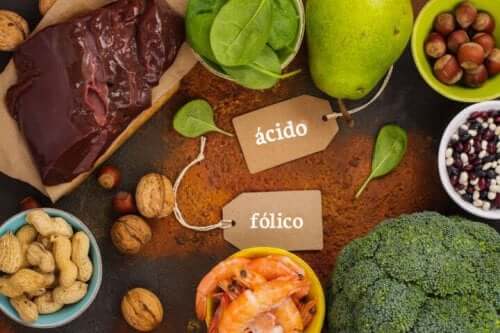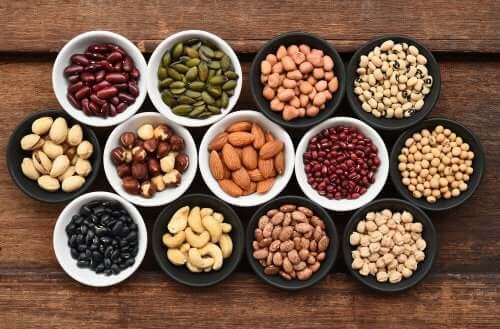5 Ways To Increase Folic Acid Intake During Pregnancy

Folic acid intake during pregnancy is extremely important for the proper development of your baby. In fact, doctors normally recommend that you start taking it as soon as you know you want to get pregnant.
Now then, why is folic acid so important for the healthy growth of the fetus? Folic acid, also known as vitamin B9, folates or folacin, helps to prevent congenital defects in the baby’s neural tube.
Before and during pregnancy, it’s recommended that you consume 400 mg of folic acid daily so that your little one’s organs and tissues develop properly. We’ll look at a few ways to increase your folic acid intake during pregnancy below.
Increase folic acid intake during pregnancy

As we already mentioned, adequate daily consumption of vitamin B9 will help to prevent congenital defects that affect the baby’s spinal column, spinal cord, or brain. Among others, the most common defects are:
- Spina bifida: a condition where the fetus’s spinal column doesn’t close completely, causing, generally, damage in the nerves and causing light paralysis of the legs.
- Anencephaly: a defect that doesn’t allow the proper development of the skull and brain. This condition is associated with stillbirths and death soon after birth.
- Chiari malformations: these are caused when the brain tissue extends into the spinal canal. They are malformations of the cerebellum structure, the part of the brain that manages balance. The damage can be small or extensive and can affect the child’s life to varying extents.
In addition, ingesting folic acid is good for you too, since it helps you to decompose and use new proteins and to prevent gestational anemia.
How do you increase your folic acid intake?

Now it’s clear why it’s important you don’t suffer from a folacin deficit, let’s take a look at some ways you can increase your folic acid intake during pregnancy.
You might be interested in: Eleven Habits You Should Avoid During Pregnancy
1. Folic acid supplements
As we noted at the start of the article, specialists recommend you supplement your diet with folic acid supplements. In fact, if you talked with your gynecologist before trying to get pregnant, they would almost certainly recommend that you start taking supplements three months before getting pregnant.
The daily recommended amount is between 400 and 600 mg. Consult your doctor before taking any supplements.
One tip: take the folic acid supplement at the same time every day. Keeping a routine is the best way to remember to take it. Another idea? Use your phone alarm to remember to take it.
2. Eat fruits and vegetables with folic acid

It’s important that you include different fruits and vegetables high in this vitamin in your diet during pregnancy. Therefore, you should eat daily between 4 and 5 portions of:
- Chard (140μg/100g)
- Spinach (140μg/100g)
- Broccoli (90μg/100g)
- Lettuce (34μg/100g)
- Asparagus (30μg/100g)
- Tomato (28μg/100g)
- Celery (12μg/100g)
- Avocado (11μg/100g)
- Carrot (10μg/100g)
- Pumpkin (10μg/100g)
- Citric fruits like strawberries, kiwis, oranges, raspberries, and papaya.
3. Eat legumes every week
Legumes are the main source of vegetable proteins and, additionally, they’re rich in folic acid and fiber, which is very important to avoid constipation during pregnancy. You can make all sorts of dishes with them, from stews to salads.
4. Add dried fruits and nuts to your meals

Dried fruits and nuts are the perfect things to add a crunchy texture to yogurt, cakes, or bread. You can also use them as part of your salads or as a healthy snack! These foods provide good amounts of folic acid, as well as healthy acids like omega-3.
5. Buy fortified foods
If you need to increase your folic acid intake during pregnancy, choose fortified flour, rice, pasta, and breakfast cereal. Read the tags to verify the percentage of folic acid they provide.
Note: Some studies have suggested that excessive consumption of folic acid can have negative consequences for the baby, specifically during cellular multiplication. Consult your doctor to see if you need to take any supplements.
As you can see, consuming folic acid during pregnancy is very important for you and your baby. See your doctor before trying to get pregnant to find out if you need to take vitamin B9 supplements. Follow the recommendations of a specialist; no one knows better how to take care of you and your baby than they do.
All cited sources were thoroughly reviewed by our team to ensure their quality, reliability, currency, and validity. The bibliography of this article was considered reliable and of academic or scientific accuracy.
- Rodríguez Dominguez, P. L., & Collazo Cantero, I. (2013). Embarazo y uso del ácido fólico como prevención de los defectos del tubo neural. Revista Médica Electrónica, 35(2), 105-113. http://scielo.sld.cu/scielo.php?pid=S1684-18242013000200002&script=sci_arttext&tlng=pt
- Sánchez, L. M. M., Jaramillo, L. I. J., Álzate, J. D. V., Hernández, L. F. Á., & Mejía, C. R. (2018). La anemia fisiológica frente a la patológica en el embarazo. Revista Cubana de obstetricia y Ginecologia, 44(2), 1-12. https://www.medigraphic.com/pdfs/revcubobsgin/cog-2018/cog182q.pdf
- Martell, G. F., Herrera, B. S., Iglesias, Y. O., & Vega, J. L. S. Beneficios de los frutos secos en los problemas cardiovasculares. https://enfermeriagaditana.coecadiz.com/beneficios-de-los-frutos-secos-en-los-problemas-cardiovasculares/
- Wiens, D., & DeSoto, M. C. (2017). Is high folic acid intake a risk factor for autism?—a review. Brain sciences, 7(11), 149. https://www.ncbi.nlm.nih.gov/pmc/articles/PMC5704156/
This text is provided for informational purposes only and does not replace consultation with a professional. If in doubt, consult your specialist.








